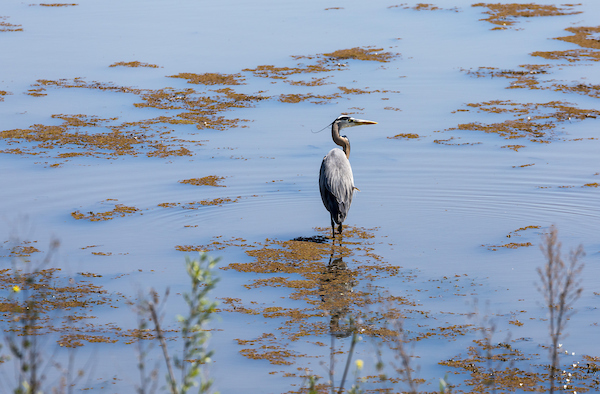The trailer bill legislation proposed by the Newsom Administration to fast-track approval and construction of a tunnel under the Bay-Delta estuary ended for the year when it did not come to the floor of either house in the state legislature by September 12. See earlier analysis here. This is a victory for people, wildlife, and the environments of northern California. Meanwhile, throughout September, protestant parties that oppose the proposed tunnel officially branded the “Delta Conveyance Project,” or DCP, presented testimony in hearings throughout the month.
The hearings are occurring before the Administrative Hearings Office of the State Water Resources Control Board (State Water Board). The hearings create an evidentiary record for the State Water Board to determine whether to change the water rights of the Department of Water Resources for the State Water Project (SWP), in order to allow construction and operation of the proposed tunnel.

A great blue heron at the McCormack-Williamson Tract Levee Modification and Habitat Restoration Project in Sacramento County. Image: Xavier Mascareñas / California Department of Water Resources
CSPA’s witnesses Dave Hurley and Chris Shutes presented their testimony on September 19. See You Tube recording starting at 4:55 (Hurley) and 6:01 (Shutes). Outdoor writer and CSPA Board Member Dave Hurley presented written testimony describing the decline of fishing and fishing-related businesses in the Delta in his lifetime. CSPA’s Executive Director Chris Shutes presented written testimony on four topics related to the DCP and State Water Project operations: operation of Oroville Reservoir, water transfers, temporary changes to the SWP’s operating rules, and predictable permanent changes to the SWP’s operating rules.
Chris used the Newsom Administration’s proposed trailer bill to fast-track the DCP as an extreme example of the effort to change limitations on SWP exports of water from northern California to southern California and the San Joaquin Valley. Chris also discussed likely technical analyses, reinterpretation of existing rules, adaptive management, and other direct efforts to change rules. He cautioned the State Water Board that it must consider the likely realities of future changed rules when determining whether or not to approve a project of this magnitude.
The water rights hearing will continue throughout October, with rebuttal testimony likely due before the end of 2025.
